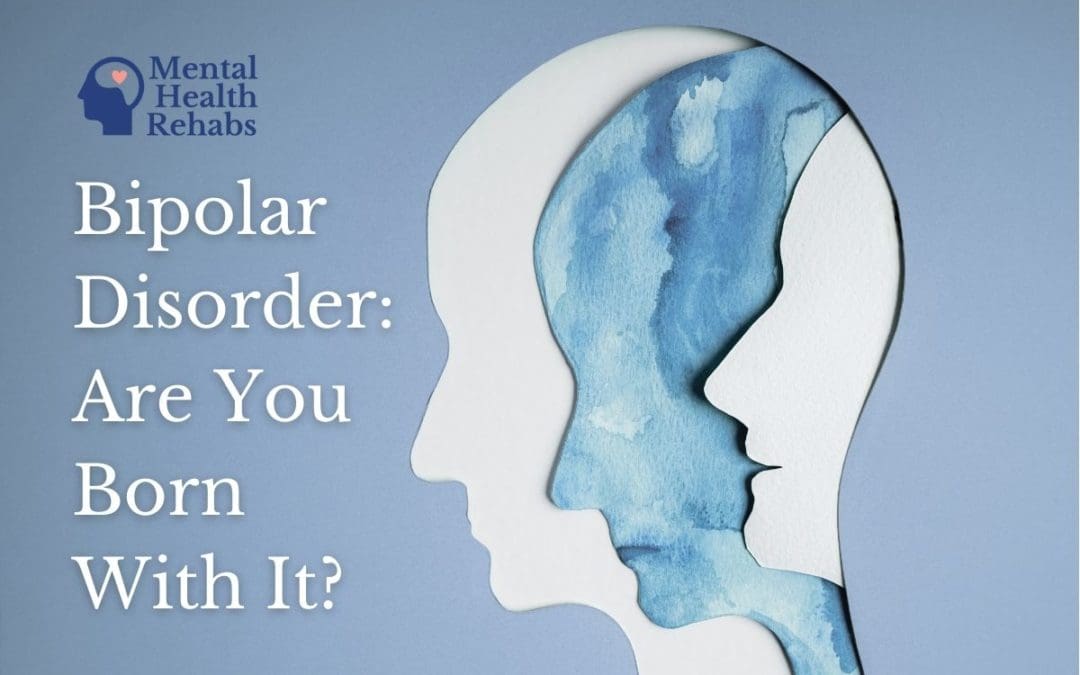Are you born with bipolar disorder or is it a mental illness that occurs when something happens to you? Science tells us that it’s a little bit of both. Your genes, the cell-building codes inherited from your parents, can lay the neurobiological groundwork that causes brain abnormalities or a predisposition for certain mental illnesses such as bipolar disorder. Sometimes mental illness is inevitable, a matter of when it presents itself, rather than ‘if’. In other cases, it’s external factors that trigger the onset of mental illness in a person who otherwise might have never experienced symptoms.
In summary: Both genetic and environmental factors can be at play when someone is diagnosed with bipolar disorder. For a better understanding of why this happens, we’ll take a closer look at the neurobiology of this illness (the de facto cause of bipolar disorder), how environmental factors can seemingly activate it, and which ones.
What Causes Bipolar Disorder?
There is no one thing that is considered to be solely responsible for causing bipolar disorder, be it your genes or your lifestyle. This is because the underlying cause has more to do with your immediate brain chemistry than anything else. Neurotransmitters are the chemicals and hormones that regulate our brain and body’s functioning. When there’s an imbalance in these vital neurological messengers (something that can have genetic or environmental causes), the resulting abnormalities are what’s identified as mental illness.
In the case of bipolar disorder, there are many neurotransmitters at play. Dopamine, serotonin, GABA, epinephrine, norepinephrine, glutamate, and acetylcholine have all been linked to BD’s underlying symptoms. However, scientists have yet to find whether there is a singular root cause for bipolar disorder or whether it’s the result of several neurochemical imbalances acting independently but simultaneously.
The Role of Genetics in Bipolar Disorder
Genetics play a major role in directly (and sometimes indirectly) affecting a person’s risk of having a mental illness. Take, for instance, depression, ADHD, addiction, schizophrenia. No matter which condition you look at, the likelihood of someone having such a disorder rises tremendously if a family member has it as well. That risk is even higher if it’s an immediate family member.
One study looked at the rates in which children of bipolar and schizophrenic parents had the same mental illness. Their findings showed that compared to children whose parents had no history of those mental illnesses, those born of parents with a severe mental illness were more than twice as likely to develop one themselves.
The question then, is why? What precisely is it that we inherit from our parents that can so drastically influence our odds of having a mental illness?
The things that make us us (what we look like and how we think and act) are passed down to us through our genes. However, genetics can also significantly influence the aspects of ourselves that aren’t readily observable. Things such as how we handle stress and how sensitive we are to it, whether we face a heightened risk of developing a drug addiction, as well as our mental health, are all predicated on the DNA we inherit from our parents. One of these unseen inheritances can include neurotransmitter imbalances (either deficiencies or surpluses), hormonal imbalances, or other abnormalities.
The Influence of External Factors
So we’ve covered how genetics plays a leading role in the outcome of a person’s proclivity to physical or mental illness. Though what we inherit from our DNA might seem an inescapable fate, genetics alone does not tell the whole story when it comes to the etiology of bipolar disorder. External factors such as stress, trauma, drug use–or a combination of the two–can create these neurological imbalances or exacerbate pre-existing conditions.
This is a finding that applies to the vast majority of other types of mental illness. Extreme emotional distress can cause reactions so intense that it permanently alters the body’s physiological or psychological functioning in some way. Post-traumatic stress disorder or PTSD is one of the most well-known examples. Not only can stress itself be a powerful catalyst that disrupts the body’s normal functioning, but it can also indirectly influence other behaviors that can heighten a person’s risk of developing or exhibiting bipolar disorder symptoms.
One of the most notable behaviors that can lead to mental illness is drug use. All kinds of mind-altering substances work by manipulating levels of one neurotransmitter or another. Knowing what we do about the multiple neurotransmitters involved in bipolar disorder, it’s easy to see how interfering with those delicate chemical balances can quickly become disastrous.
If you are a drug user with a family history of bipolar disorder or other serious mental illnesses, you face tremendous risk. Find a mental health rehab today to speak to a professional and learn how to recognize the warning signs of BD.
Sources:
https://psychcentral.com/bipolar/is-bipolar-genetic-causes-and-risk-factors

